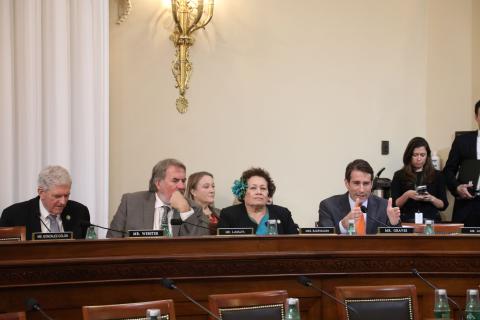Committee Passes Amata’s South Pacific Tuna Treaty Act
Washington, D.C. – Congresswoman Uifa’atali Amata is welcoming Thursday’s passage by the Natural Resources Committee of a bill she sponsored, with Congressman Ed Case (D-HI) as the original cosponsor, the South Pacific Tuna Treaty Act, H.R. 1792, which passed for consideration by the full House of Representatives.
Video of Congresswoman Amata’s brief statement on her bill is available HERE.
H.R. 1792 is a bipartisan effort to congressionally direct full implementation of the South Pacific Tuna Treaty, as previously diplomatically negotiated among the U.S. and Pacific nations.

Amata in Committee markup of her South Pacific Tuna treaty Act
“It’s good to see this bill take this step forward with bipartisan support in this vote, and I appreciate working with Congressman Case, and the key support of Chairman Westerman,” said Congresswoman Aumua Amata. “Congress has a clear oversight role in implementing this important treaty, ensuring that our negotiated tuna agreements in the Pacific are working to the benefit of our fleet. Undoubtedly, U.S. tuna production continues to face hurdles, but this diplomatic and legislative effort brings stability to the access that our fleet depends on. All U.S. policymakers should support tuna as a healthy food source for millions of Americans that strengthens our national food security.”
Chairman Bruce Westerman (R-Ark.) said, “H.R. 1792 is a bipartisan, commonsense bill that will provide more flexibility to the U.S. fishing industry to the benefit of all Americans and anyone who enjoys our incredible seafood products worldwide. Representative Radewagen has been a longtime leader on this issue and I know she will continue advocating for strong relationships in the Pacific. I am excited to see this bill pass through our committee today.”
The bill amends the South Pacific Tuna Treaty Act of 1988 to reflect the amendments to the Treaty adopted in 2016. In 2022, the Senate provided overwhelming bipartisan support for advice and consent to ratification, and this bill would complete this longstanding effort, moving into statute what has been operating under a Memorandum of Understanding, and resolving restrictions.
The Treaty stabilizes high-seas fishing days and codifies access to various island nations’ EEZ waters.
In July, the bill was examined in a legislative hearing by the Subcommitteeon Water, Wildlife and Fisheries, which heard expert testimony, including from William Gibbons-Fly, Executive Director, American Tunaboat Association. He emphasized the last true “distant water fishing fleet” under the U.S. flag operating from Pago Pago Harbor, as “multi-generational, family-owned businesses with a long and storied history as an important part of the U.S. fishing industry.”
The U.S. tuna purse seine fleet has been reduced in just a few years from 34 vessels to 13 vessels, as the fleet faced numerous severe economic challenges from increased regulation, reduced access, and more competition, especially from Illegal, Unreported and Unregulated (IUU) fishing.
###